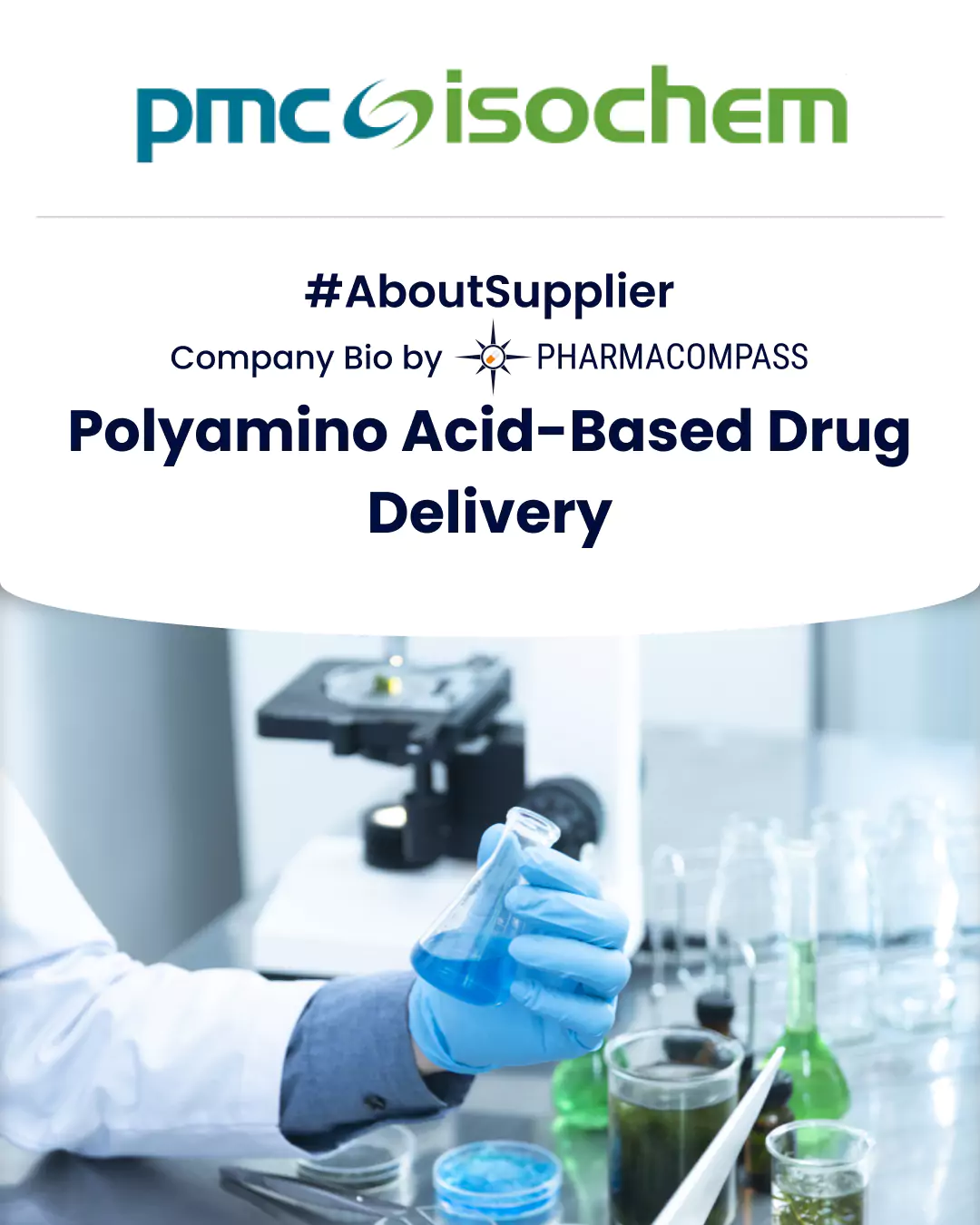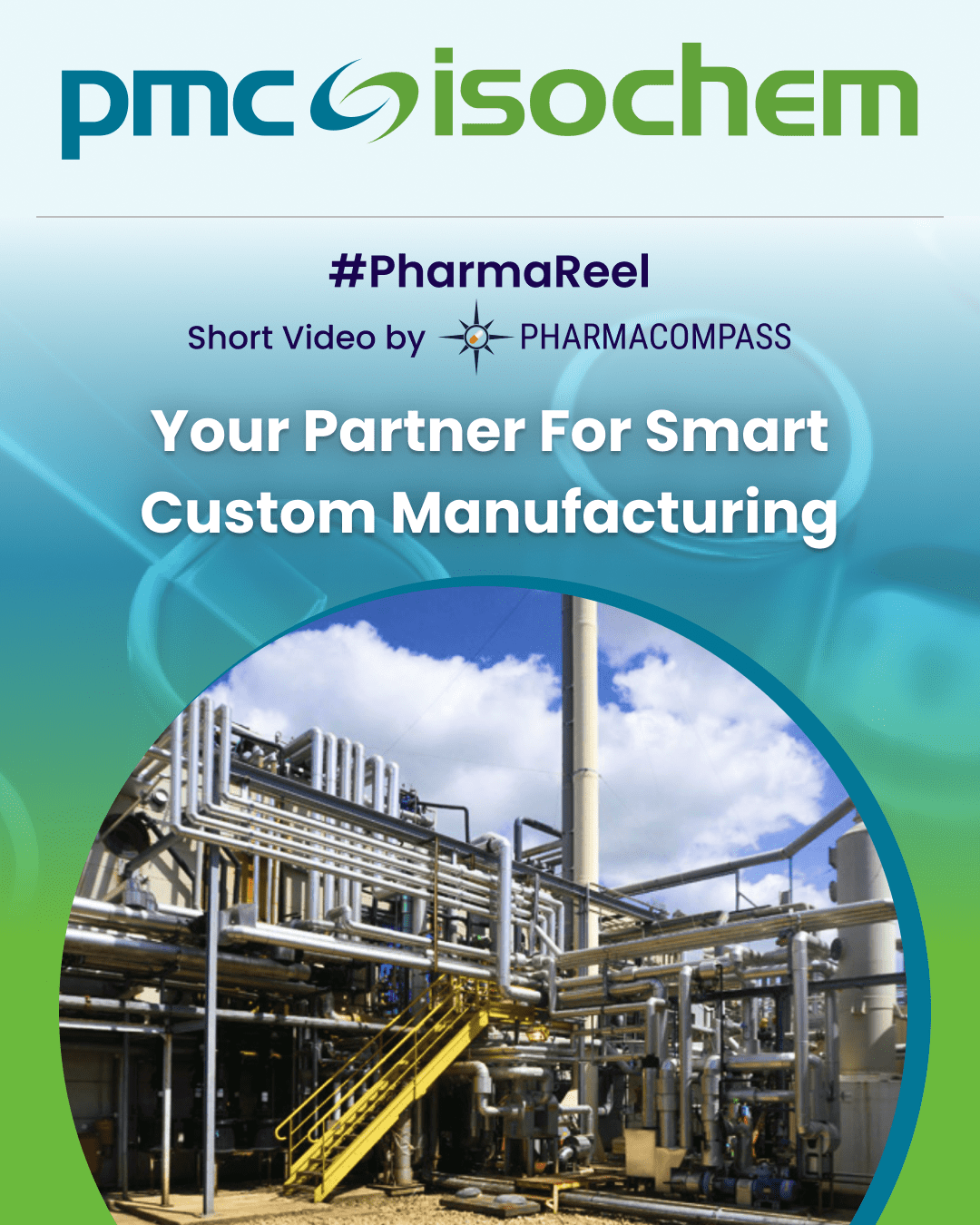
By PharmaCompass
2022-12-10
Impressions: 2261
Overview of PMC Isochem's polyamino acid (PAA) based
polymers, polymer conjugates, polypeptides, polyamides for drug delivery on
PharmaCompass.
What are polyamino acids and PAA-based drug delivery systems?
A polyamino acid, sometimes also called a polypeptide, is a synthetic biopolymer made from amino acid monomeric units. Polyamino acids (PAAs) are comparable to proteins (and peptides) as they are also composed of amino acid building blocks linked by means of amide bonds.
Structural and functional proteins, polypeptides, peptides and polymers derived from amino acids are called polyamino acids. Polyamino acids have several biological applications in tissue engineering, regenerative medicines and drug delivery systems, etc.
Additionally, polyamino acids are endowed with remarkable biological functionalities, such as a target-specific delivery and rapid metabolization of their degraded products. The hydrophilicity of the amino acids influence the degradation rates of polyamino acids.
The most important polyamide homo- and copolymers that are widely used in drug delivery are poly(amidoamine), polylysine, polyaspartic acid and poly(glutamic acid).
Novel polymer-based drug delivery systems are being developed to change the physicochemical and pharmacokinetic characteristics of drug molecules for controlled delivery. The capability to enable unique and highly-targeted biological functions make proteins and peptides ideal candidates for drug delivery systems. The advantages of using Polyamino acids or polyamide polymer as a drug delivery system include localized target-specific delivery, biocompatibility, biodegradability, flexible physicochemical modification, slow degradability, sustained release and stabilization.
Polyamino acids are widely utilized in the formulation of
chemotherapeutics to achieve selective drug delivery for the right amount of
time, which will reduce drug-related adverse effects and boost anti-tumor
efficacy.
What are the applications of polyamino acids based delivery?
Poly(amino acid)s are the most commonly used polyamides in drug delivery. The use of peptides as carriers of nucleic acids for controlled delivery into target cells and organelles is one significant application of such functional materials. There are various other applications of polyamino acids which are as follows:
- Poly(amino acid)s are utilized in a variety of medical and biological applications including cell adhesion, drug delivery, gene therapy, diagnostic, oncology, antibacterial, antifungal and surface chemistry.
- Polyamino acids-based delivery systems have highly attractive material properties such as biodegradability, non-cytotoxicity, and mechanically durability. Natural polyamino acid (PAA) has been widely utilized in the controlled delivery of drug, protein and gene because of its excellent biocompatibility.
- Polyamino acid based delivery is frequently utilized in targeted drug delivery and controlled drug delivery. Polyamino acids deliver a therapeutic to a targeted area through site-specific interactions, exploit transmembrane transport systems and deliver a therapeutic payload to a targeted site, devoid of side effects.
- Water-soluble drug-polymer conjugates offer benefits such as enhanced drug pharmacokinetics and pharmacodynamics, minimal toxicity to essential organs, non-immunogenicity, tissues or cells and improved drug buildup at the target site to enhance targeted drug delivery via carrier-based systems.
- Poly(amino acid)s are the first class of biomaterials and have biomedical applications because of which they are used as nonviral gene delivery vectors. Therefore, the design and synthesis of polyamino acid vectors are of great interest.
- Microscale carrier is an important component of the drug delivery system that enables it to be well designed for enhancing the pharmacological and therapeutic features of drug administration.
- Poly(amino acid)/polypeptide as functional materials have a variety of features like stimuli-responsive, self-assembling, nano-scale and self-healing
- Silk is a structural protein that exhibits properties of
self-assembly, mechanical toughness, processing flexibility, biodegradability
& biocompatibility, making it extremely useful for several human
therapeutic interventions.
What are the different methods of synthesis of polyamino acids?
In the field of sustainable chemistry and materials engineering, there is a growing interest in the development of an engineered biopolymer, such as a biomass-derived polyamide. Materials made of polyamino acids (PAAs) have attracted a lot of attention in the field of biomedicine because of their exceptional biocompatibility and biodegradability.
Current synthesis techniques that are used to synthesize a biopolymer like a polypeptide and polyamino acid, such as solid-phase peptide synthesis and recombinant DNA techniques, still have problems with their production capacity, atom economy and sequence regulation. It is important to closely regulate the molecular weight within a narrow range when synthesizing polyamino acids (PAAs) for drug delivery and biomedical applications.
Polypeptides are derived from the ring-opening polymerization of alpha-amino acid N-carboxyanhydrides (NCAs). Chemo-enzymatic synthesis can be used for the synthesis of polyamino acids. It is one possible option for the efficient synthesis of poly(amino acid)s, regarding yield, reaction time and atom economy.
The production of polypeptides using the ring opening polymerization of amino acid N-Carboxyahydride monomers results in limited polydispersity, little side product formation, high reproducibility, flexible architectures and precise functionalization of the polypeptide backbone.
Polymers based on amino acid monomers have attracted a lot
of attention in drug delivery. As the manufacturing of PAA or polyamides
involves numerous challenges, many companies prefer to outsource their needs.
There are several CDMOs for polyamino acids offering custom synthesis and
manufacturing for GMP Polymers and copolymers based on various polyamino acids
like Poly-L-Lysine, Poly-L-Glutamic acid, Polysarcosine, etc.
What are the polyamino acid based polymer manufacturing services offered by PMC Isochem?
A contract development and manufacturing organization (CDMO), PMC Isochem provides amino acid based polymer diversity for drug delivery and innovative treatments. From R&D to GMP large-scale production, PMC Isochem offers polypeptide excipients and drug-polymer conjugates along with GMP polymers and copolymers based on various polyamino acids like Poly-L-Lysine, Poly-L-Glutamic acid, Polysarcosine, etc.
Polyamino acid based delivery is a major area of interest for advanced biomedicines because of its biocompatibility and biodegradability. The chemical & architectural versatility of polyamino acids & polypeptides is enormous. Polyamide acids are utilized in several therapeutic areas, including immunotherapy, oncology, gene therapy, inflammatory, neurodegenerative, infectious, diagnosis, skin care, etc. Synthetic GMP polyamino acids are being used in biomedical and drug delivery applications as they are structurally similar to naturally occurring proteins. Drug–polymer conjugates offer improved pharmacokinetic and properties with enhanced stability for targeted drug delivery.
PMC Isochem is a CDMO for polyamino acids integrated in strategic monomers NCA (α-aminoacid N-CarboxyAnhydride) offering
- Standard and customized GMP polyamino acid
- Development and characterization
- Scale-up and clinical supply
- Commercial manufacturing
PMC Isochem has 40 years experience in large-scale GMP custom manufacturing of polyamino acids (PAA) from kilolab to full-scale production. It has 3 production sites in France and has manufacturing facilities audited by the US & EU regulatory agencies.
PMC Isochem is a widely known CDMO for polyamino acids. It provides custom-made Polyamino acid (PAA) design for its clients, which is supported by integrated NCA supply and development for GMP polymers and copolymers based on different polyamino acids like Poly-L-Lysine, Poly-L-Glutamic acid, Polysarcosine, etc.
PMC Isochem has a highly skilled and diversified R&D team with academic affiliations. It has fully equipped infrastructures and a network for accessing cutting-edge technologies for polyamino acid based delivery. PMC Isochem has a lean approach to provide cheaper, faster and better solutions, which allows its clients to save cost, time and risk. To help its customers grow their businesses, PMC Isochem has a flexible and creative business development team with IP portfolio and proprietary GMP polyamino acid (PAA) systems.
The PharmaCompass Newsletter – Sign Up, Stay Ahead
Feedback, help us to improve. Click here
Image Credit : Biosynthesis, tech advancements by PharmaCompass license under CC BY 2.0
“ The article is based on the information available in public and which the author believes to be true. The author is not disseminating any information, which the author believes or knows, is confidential or in conflict with the privacy of any person. The views expressed or information supplied through this article is mere opinion and observation of the author. The author does not intend to defame, insult or, cause loss or damage to anyone, in any manner, through this article.”






